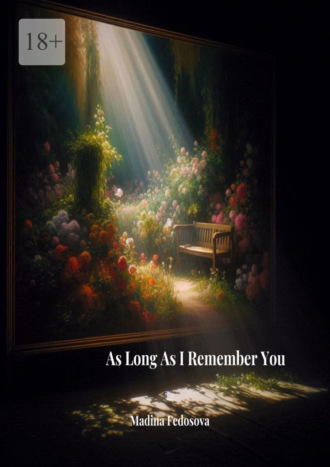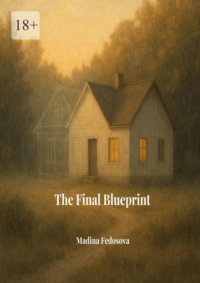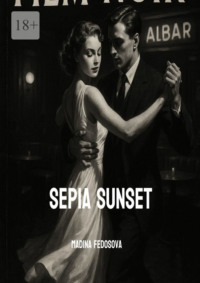
Полная версия
As long as I remember you
«Just a bit stuffy with all these people,» she muttered, avoiding his alarmed, searching gaze and looking somewhere in the region of her shoes. «And these chandeliers… they’re too bright. The light hurts my eyes. Let’s… let’s just go home.»
He didn’t argue. He firmly led her home, bypassing the tempting bookshop windows and the enticing smells from bakeries. In their quiet apartment, he sat her down on the deep sofa in the living room, made strong tea with lots of sugar – «for the nerves,» as his grandmother used to say – and, sitting opposite her on a low pouf, took her cold, stiff hands in his warm, living ones.
«Alright, that’s enough. The games of silence and «I’m-just-tired’ are over. First thing tomorrow morning, I’m calling and booking you a doctor’s appointment. Starting with a general practitioner. This is not up for discussion, Amelia. Look at me. This is not up for discussion.»
She wanted to resist, to deny, to say it was nonsense, that it would pass, that it wasn’t worth making a mountain out of a molehill and wasting doctors’ time on trifles. But the words stuck in her throat, and she could only move her lips soundlessly. She just nodded silently, unable to tear her gaze away from their intertwined fingers. His – with clearly defined tendons, warm, confident, strong. Hers – pale, cold, and alien, like those of a marble statue.
The appointment with the GP, Dr. Alice Wright, passed in a thick fog. A cozy office filled with soft, diffused light, with a large aquarium where bright, jewel-like fish swam lazily; it smelled of antiseptic and something sweetish, vanilla-like, perhaps the doctor’s own hand cream. Dr. Wright, a woman in her fifties with kind, incredibly intelligent eyes behind thin metal-framed glasses, listened attentively, without interrupting, to the confused, carefully edited story of «overwork,» «stress,» sudden dizziness, numb fingers. Amelia deliberately omitted the pulsating, reality-distorting colors. That sounded like outright delirium, a direct path not to a neurologist but to a psychiatrist.
«A demanding schedule, a creative profession requiring the highest concentration and emotional investment… that can certainly produce such symptoms,» said Dr. Wright, her voice as calm as the water in her aquarium. «Perfectly understandable. But, Amelia, we won’t read tea leaves. To rule out any doubt and reassure your wonderful husband, let’s get you checked out. I’ll refer you for an MRI – a magnetic resonance imaging scan – to see if everything is alright with the blood vessels in your brain, if there are any micro-changes. And I’ll give you a referral to my colleague, the neurologist, Dr. Edgar Reed. He’s an excellent specialist, particularly in peripheral neuropathies. This is just for maximum reassurance, my dear. So we can all sleep soundly. Don’t be frightened ahead of time.»
The very word «MRI» sounded like a cold, metallic sentence to her. And the word «neurologist» – like something final, irrevocable, smelling of formalin.
The magnetic resonance imaging scan became her first real circle of hell. First, an impersonal changing room where she was told to remove all metal, including the silver nightingale pendant – a gift from Luca. Then, a cold, brightly lit hall with fluorescent lamps, where in the center stood a huge, alien-looking white monolith, like a portal to another dimension. The assistant radiographer, a girl with an indifferent face, laid her on a narrow, hard sliding table, placed pillows under her head and knees, put headphones on her ears that resembled giant swimming earphones.
«The main thing is to lie absolutely still,» she said in an impersonal, rehearsed-cheery voice. «The machine will be very noisy. Different sounds. That’s normal. Just relax.»
The table with her body slid smoothly into the narrow tunnel. Being inside that tight, white, hermetically sealed space, with just fifteen centimeters between her face and the top, was worse than any nightmare. A crushing, physical claustrophobia descended upon her, triggering a panic attack she never knew she had. Her heart hammered in her throat, her breath caught, becoming rapid and shallow. And then the noise began. A deafening, inhuman, mind-rending roar, banging, grinding, screeching like an alarm signal. It felt as if the very air around her was vibrating, that the bones of her skull were about to crack from the unbearable pressure, that the atoms of her body were being torn apart by the sound. She lay with her eyes closed, teeth clenched to the point of pain, nails digging into her palms, her only thought pulsing in time with the infernal din: «Get out. I have to get out of here at any cost. I can’t stand another second of this.»
Mentally, she tried to transport herself to that lavender field. To summon the warmth of the sun on her skin, the smell of heated pine, the sound of bees, Luca’s face, his hand in hers. But the images were blurred, unclear, displaced and consumed by the all-engulfing, white, soulless terror of the machine. Something small and defens inside her was weeping and screaming.
When the table finally, after an eternity, slid back out, she was drenched in cold sweat, and the muscles in her back and neck ached from the minutes-long tension.
«It’ll be fine,» the same assistant said, helping her to her feet, which felt like cotton wool. Her voice sounded as if from underwater. «The results will be ready in a few days. The doctor will contact you.»
In a few days. That wait became the most exquisite torture. They tried to live a normal life, to play at normality. Luca worked from home in his study, answering endless messages and taking calls, but she could physically feel his gaze constantly finding her, skimming over her, appraisingly, anxiously, scanning her every movement. She tried to return to the studio, took up simple, meaningless, mechanical tasks – mixing paints on the palette into abstract swirls, washing brushes until they squeaked, rearranging folders with old sketches, re-reading her own journals with notes on colors. But her fingers betrayed her more and more brazenly. One morning, she couldn’t fasten her own bra. Her fingers simply wouldn’t obey, couldn’t coordinate, couldn’t catch the tiny, slippery clasp behind her back. She stood in front of the bedroom mirror, looking at her reflection – pale, with huge, frightened eyes – and quiet, helpless tears of rage and despair rolled down her cheeks.
Finally, the day of the appointment with the neurologist, Dr. Edgar Reed, arrived. His office in a prestigious private clinic on Harley Street was completely different – sterile, cold, high-tech. No aquariums, paintings, or vanilla scents. It smelled of ozone from the air conditioners, cold metal, and a faint, elusive chemical cleanliness. Dr. Reed himself was a man in his sixties, dry, trim, with graying temples and a penetrating, scanning gaze from blue eyes that seemed to see not you, not your soul, but your nerve impulses, synapses, and the speed of signal conduction along your fibers.
He silently studied the MRI results lying on his perfectly clean black glass desk for several minutes. The images showed the gray matter of her brain, streaked with white veins like frost patterns on a winter window.
«We see no vascular pathologies, tumors, obvious focal changes, or signs of multiple sclerosis,» he said in an even, dispassionate, almost mechanical voice. «That is very good news. However, your symptoms, which Dr. Wright reported and which you described in the questionnaire… they concern me.»
He conducted a series of tests, resembling a strange, slightly humiliating dance. He asked her to touch the tip of her nose with her index finger with her eyes closed – her finger trembled, missed, and poked her cheek. He asked her to walk a straight line painted on the floor, as if on a tightrope, first forward, then backward – she swayed heavily on the second step, and Luca instinctively jumped up to support her. He checked her reflexes on her knees and elbows with a small hammer – they were strangely lively, her legs jerking with exaggerated force. He poked her skin on her arms and legs with a sharp object, then a blunt one, asking what she felt. The sensations were dulled, as if the skin on her limbs was covered with several layers of thin cellophane.
Then he took a sheet of thick white paper from his desk with simple geometric shapes drawn on it – a square, a circle, a triangle – and asked her to name them. She looked at the circle, and its smooth, clear contours swam, blurred, as if someone had held a heated glass to it or spilled water on the paper.
«A circle…» she said uncertainly, hesitating. «It seems like a circle. But the edges are… blurry.»
Luca, sitting nearby in a leather chair and having maintained a tense silence until then, let out a sharp, loud exhale.
Then Dr. Reed took a small glass vial with a dropper from his desk.
«Try to identify the smell,» he asked, bringing it to her nose.
Amelia inhaled. Just six months ago, she could easily, with her eyes closed, distinguish arabica from robusta, detect notes of cinnamon, cardamom, or burnt sugar in the most complex aroma. Now she felt only a weak, distant, almost abstract smell of something bitter, ashy, devoid of any nuance or depth.
«Coffee?» she guessed, looking at him hopefully.
Dr. Reed silently, without any emotion, placed the vial back and made another note in her thick paper file. The sound of his pen scratching the paper was deafeningly loud in the tomb-like silence of the office.
«Alright,» he said finally, setting down the pen and folding his hands on the desk. His face was impassive, a professional mask, but in the depths of his too-bright blue eyes, a new, heavy, understanding depth appeared. He was looking now not at her, but at both of them. «Mrs. Jovanovic. Mr. Jovanovic. The preliminary data and the absence of clear signs on the MRI… give us only part of the picture. It’s like assembling a puzzle without the box showing the original image. Your symptoms – numbness, loss of sensation, impaired coordination, possible visual distortions, changes in smell… they can point to a whole spectrum of neurological conditions. Some of them, for example, some types of neuropathy, are quite manageable with therapy. But…»
He paused, carefully choosing his words, his gaze shifting from her to Luca, as if seeking an ally in the face of a difficult conversation.
«But in order to rule out… other, more serious and, fortunately, rarer possibilities, we will require a much deeper and more comprehensive examination. Blood tests, extensive ones, for specific antibodies. Possibly genetic tests. A nerve conduction study. This will take time. And we will need to observe the dynamics. To see… how the symptomatology behaves.»
He fell silent again, letting them digest the information.
«There is a group of diseases… neurodegenerative. They are rare, especially at your age, it’s not the first thing we think of. But their course… is unfortunately often progressive. They affect the nervous system, gradually, step by step, disabling various functions – motor skills, sensation, vision, hearing, cognitive abilities…»
He said something else – about a plan of action, the need to be under observation, the importance of staying calm. But Amelia hardly heard him anymore. She was watching his lips moving in the perfect, sterile silence of the office, and in her head, like an echo of that hellish roar from the tomography machine, only one word was sounding, one terrible, unfamiliar, and therefore even more horrifying word that he had not yet spoken aloud, but which already hung in the air, heavy as lead, soaking into the walls, the skin, the very heart.
Progressive.
It did not mean «curable» or «temporary.» It meant it would not get better. It meant the path led only in one direction. It meant the endless summer was over, without ever having truly begun, and ahead lay only a long, hopeless winter.
Chapter 4
The Silence After the Storm
Emerging from the sterile hall of the clinic on Harley Street, they seemed to fall into another, overly bright and roaring world. London, which had remained behind the heavy oak doors with brass plaques, lived its carefree, bustling life. Dark blue sports cars and sedate sedans swished past on the roadway, young doctors in scrubs smoked and laughed on the steps of a neighboring mansion, and from the open windows of a second-floor apartment came the strains of a piano and someone’s trained voice practicing an aria. The air, which usually held the aromas of coffee from a nearby roastery, the sweetish smoke from chimneys, and the wet copper of autumn leaves for Amelia, was now empty and flat, as if filtered, stripped of all its shades and depth. She walked, mechanically moving her legs, and felt nothing but a faint, unpleasant chemical aftertaste from the clinical air.
They walked in silence to the car parked in a side street. Luca silently opened the door for her, she silently climbed onto the seat of worn brown leather, staring at one tiny, almost invisible crack on the dashboard. He started the engine, and the familiar, dull roar of the motor seemed deafeningly loud, crashing against her eardrums. The world beyond the tinted glass swam like a blurred, nervous watercolor – a scarlet bookshop sign, the emerald crowns of plane trees on a square, the gray-blue surface of the Thames suddenly revealed around a corner – all merging into one restless, meaningless smear.
Luca didn’t drive home. He instinctively turned towards the Serpentine, found a secluded parking spot at the very end of a shaded avenue, under the canopy of a huge, old elm. He cut the engine. Silence fell, broken only by the rustle of leaves overhead, the distant cry of a seagull, and the muffled hum of the metropolis, like the sound of the sea in a shell.
«Amelia,» his voice sounded unusually hoarse; he was the first to break the oppressive, unbearable silence that hung in the car like lead. He turned to her on the seat, his face painfully pale, tiny beads of sweat on his forehead and upper lip even though it was cool in the car. «Did you hear what he said? Nothing definitive. No diagnosis. These are just… theories. Possible paths for diagnosis. We need to go through all these examinations, gather all the data, and then…»
«Progressive,» she said quietly, without a single inflection, almost soundlessly, still staring at the same spot on the cracked leather panel. The word hung between them, huge, indisputable, and cold as a tombstone.
«Stop it!» His voice broke into an unexpectedly high, almost hysterical shout, and he flinched at this sudden loss of control. He clenched his fists so hard the knuckles turned white, took several deep, noisy breaths, trying to regain his composure. «I’m sorry. I’m sorry, darling. But we can’t… we have no right to jump so far ahead. It could be anything! A simple B12 deficiency, which causes terrible neuropathies! An autoimmune disease they treat successfully now! Chronic stress, for God’s sake, which can mimic anything! He said it himself – there are manageable conditions!»
She finally turned her head towards him, slowly, with effort, as if against an invisible force. And in his wide, moist eyes, she saw not confidence, but a panicked, animal, genuine fear. He was trying to convince not her, but himself. The sight was a thousand times more painful and terrifying than all the measured, dispassionate words of Dr. Reed.
«My fingers can’t feel small details, Luca,» she said with an icy, detached calm she didn’t recognize in herself. «I can’t tell silk from wool by touch. I can’t tell the difference between the smell of freshly ground coffee and the smell of something burning. I see familiar colors on my palette moving and pulsating like living, painful beings. I can’t walk five steps in a straight line without losing my balance. This isn’t vitamins. This isn’t stress. This is something… inside me. Something that’s gnawing at me from within. Like a worm eating a fruit.»
She spoke evenly, methodically, without tears, without hysterics. This emotionless statement of facts was more frightening than any storm. It was a silent, horrifying acceptance.
He covered his face with his hands, his strong shoulders shaking. He, her rock, her support, her Lukaš, who could negotiate with the most stubborn publishers and untangle the most complex contracts, was utterly powerless against this invisible, faceless enemy. He cried quietly, soundlessly, his whole body shuddering, and these restrained sobs were more agonizing than loud wails.
Amelia looked at him, and suddenly the strange calm left her. A new wave – this time not of shock, but of grief, impotent rage, and absolute, all-consuming fear – washed over her, sweeping away the icy numbness. Her body convulsed in a silent, spasmodic sob, tears streamed down her face, hot, salty, burning her cheeks. She couldn’t breathe, a tight, painful spasm constricting her throat.
He immediately pulled himself together, took his hands from his face, his own eyes red and swollen. He reached for her, unbuckled her seatbelt, and pulled her to him, held her so tightly, so desperately, that it knocked the breath out of her. She buried her face in his chest, in the coarse wool of his jacket, and wept, soaking up the familiar, dear smell of his skin, now mixed with the bitter smell of sweat and fear.
«Everything will be alright,» he whispered into her hair, his voice breaking, his lips touching her temple. «I’m with you. We’re together. We’ll handle this. I promise you. I’ll find the best specialists in the world, we’ll consult everywhere we can. We’ll fight. We…»
«I don’t want to fight!» she cried out, pulling away from him, her face contorted in a grimace of pain and unjust rage. «I don’t want to declare war on myself! On my own body! On my own brain! It’s me! These are my hands! My sight! How can I fight them?! I want to paint, Luca! I want to smell oil paint and turpentine! I want to taste that wine we drank in Tuscany! I want our children running in the garden! I want that porch and that sunset!» She beat her fists against his chest, weakly, helplessly, like a trapped bird. «It’s monstrous! It’s some kind of senseless, cruel mistake! It’s not fair!»
He didn’t stop her, didn’t try to calm her, letting her pour out all the accumulated rage, all the despair. He just held her, accepting these weak, desperate blows like one accepts hail, knowing it will soon end.
When her strength finally gave out, she went limp in his arms, helplessly dropping her head onto his shoulder. The tears flowed on their own, quietly, endlessly, leaving dark, wet stains on his jacket.
«I can’t lose you,» he whispered, and there was such a bottomless, raw pain in his voice that she wanted to scream from helplessness again. «I won’t allow it. I won’t let it happen.»
«You’re already losing me,» she retorted with the bitter, merciless truth of despair. «Right now. This very second. With every breath I take. Piece by tiny piece. What was me – it’s leaving, and it won’t come back.»
He fell silent, just holding her tighter, almost convulsively. They sat like that for what seemed an eternity, until the long autumn twilight began to paint the park in lilac-lead hues, and the headlights of cars passing on the embankment lit up like hundreds of indifferent yellow eyes.
He started the car and this time drove home. The silence in the car was no longer oppressive, but exhausted, burnt out, like a field after a fire.
At home, they were met by the familiar, deep silence of their dwelling. It smelled of parquet wax, old paper from his study, and a light dust mixed with the faintest scent of dried lavender in a vase on the chest of drawers. Their fortress. Their sanctuary, which had suddenly become precarious and fragile as a house of cards.
Luca led her to the kitchen, sat her on a chair at the large oak table, and began making tea. He did it with a particular, almost ritualistic care – measuring the leaves, waiting for the water in the kettle to cool to the right temperature, pouring it into thin porcelain cups inherited from his great-grandmother. The clink of a spoon against porcelain, the hiss of boiling water – all these familiar sounds were part of the old, normal life that had already cracked and was slowly, inexorably crumbling.
He placed a cup in front of her. Steam rose from it in a thin, twisting thread, dancing in the beam of light from the table lamp.
«We will act,» he said quietly, but with a returning, steely firmness in his voice. He sat down opposite her, his eyes serious and full of determination. «First thing tomorrow morning, I’ll start calling, writing, searching. Oxford, Cambridge, the Mayo Clinic, Zurich, Boston. I’ll gather every possible opinion, every existing protocol. We won’t give up, hear me? We won’t give up.»
She watched the steam rising from the tea. It was incredibly beautiful, alive, complex to depict. She tried to imagine how she would paint it – with semi-transparent glazes, light, almost weightless strokes of lead and silver white.
«And if they all… in unison… say the same thing?» she asked, not taking her eyes off the cup, watching the pattern on its bottom disappear under the dark liquid.
«Then…» he paused, choosing his words, and placed his large, warm hand over her cold, motionless one lying on the table. «Then we will live with it. But we will live. Not exist. But live. Every day given to us. Every hour. Every second. We will live as fiercely, as fully, as we possibly can.»
She slowly, heavily, raised her eyes to him. There was no trace of panic or denial in his gaze now. There was a grim, unshakable resolve. There was that very strength that had once made him, a young, unknown guy from Prague, come to a foreign, huge city and build a life from scratch.
«How?» she exhaled, and her voice held, for the first time, not hopelessness, but a question. A weak, frightened, but still a question. A call for a plan. For hope.
«We will remember,» he said simply, without pathos. «I will be your memory. Your hands. Your eyes. As long as I breathe, you will not forget a single moment of our life. Not a single shade of a sunset over the Thames. Not a single smell of a spring rain in Covent Garden. I will tell you about them. I will read you those very poems you love. We will look at albums with reproductions, and I will describe every painting to you. We will live in our garden, Amelia. Even if… even if it becomes difficult for you to be in it alone. I will be your guide.»
He spoke, and there were no sweet, comforting illusions in his words. There was the harsh, unshakable truth of a love that does not deny pain and horror, but accepts them and stands beside you to share the burden.
She didn’t answer. She just turned her palm over and squeezed his fingers. Weakly, barely perceptibly, almost without pressure. But it was a movement. It was not a capitulation, but the beginning of a new, terrifying, uncharted, and only possible path.
She looked out the window. Twilight had fully gathered over London, thousands of lights were coming on, turning the city into a scattering of jewels. Somewhere out there, far away, remained their lavender field in Kent, their old apple tree, their laughter, imprinted in memory. And she made a quiet but firm vow to herself – as long as her eyes saw light, even if distorted, and her heart felt this rending pain, she would cling to it. To every ray. To every, even the most bitter, second.
Art is not about leaving a mark. It’s about becoming a bridge for someone else’s sorrow, a thought, not her own but so precise, flashed through her mind.
Now she had to become a bridge for herself. To throw it across the black, bottomless abyss that Dr. Reed’s office had just opened within her. And the first, most terrible step had been taken.
Chapter 5The Inner GardenThe thought of saying it all out loud again felt physically unbearable to Amelia. Every newly spoken word made the shadow of the diagnosis – still vague, presumptive, but no less dreadful – more dense, more tangible. It was letting the monster from under the bed into the lit room, giving it a name and the right to exist. Luca took upon himself all the fuss of finding doctors, organizing consultations in Oxford and Zurich, filling the agonizing wait with a feverish, almost desperate activity that gave him the illusion of control, of some kind of forward movement. Amelia, meanwhile, withdrew into herself, spending long hours in the studio, not touching the paints, but just sitting in the old leather armchair by the window and looking at the unfinished, promising sketch of the lavender field. It now seemed to her a cruel mockery, a bright, poisonously vivid memory of a world of sensations that was slowly but inexorably closing to her, like the last ray of sun disappearing beyond the horizon.









